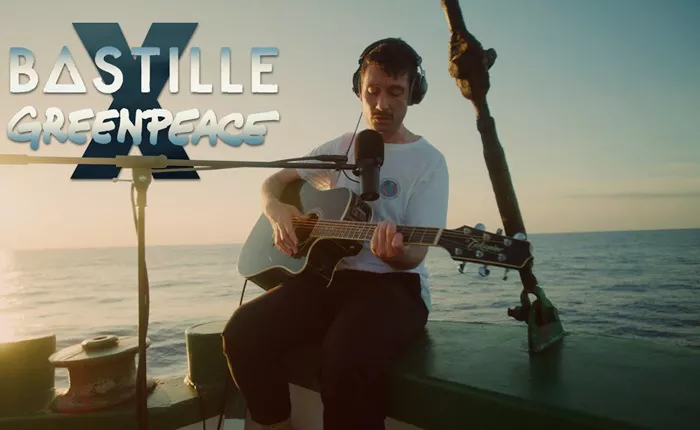Dan Smith, the frontman of Bastille, has recorded a live performance of an unreleased song titled “Blue Sky & the Painter” from a Greenpeace ship in the middle of the Atlantic Ocean, near the infamous Bermuda Triangle.
Known for hits such as “Pompeii” and “Happier,” and his recent collaboration with Hans Zimmer on the Planet Earth III score, Smith joined a Greenpeace UK voyage aboard the Arctic Sunrise to learn about ocean conservation. The performance location, the Sargasso Sea, is a critical marine habitat recognized by scientists for its rich biodiversity and need for protection from industrial fishing, shipping, and other threats.
The video captures Smith playing an acoustic guitar on the prow of the Arctic Sunrise as the sun sets over the ocean. “Blue Sky & the Painter” previews a new song inspired by Edvard Munch’s experience of finding light after darkness, a theme Smith found fitting for the mission to protect the ocean.
Smith explained, “The song is about Edvard Munch finally seeing a crack of light in life after a long period of darkness, and it felt like a theme that resonated with this particular opportunity that we now have to protect these vast blue spaces that we all depend on. I was invited onto this iconic ship to learn and help out, but when we found ourselves in unusually calm water within the Bermuda Triangle, 240 nautical miles away from the nearest land, it just felt like an ideal opportunity to collaborate with the crew on capturing this song.”
During his three days onboard, Smith participated in scientific research, spotted humpback whales, used an underwater microphone to capture sounds of marine life, and collected seawater samples for DNA analysis. He also joined a beach clean-up on Cooper’s Island in Bermuda.
Smith supported Greenpeace UK’s open letter urging the next UK government to enshrine the Global Ocean Treaty into law and propose the Sargasso Sea as the first ocean sanctuary under the treaty. The Global Ocean Treaty aims to protect at least 30% of the world’s oceans by 2030, a target scientists agree is necessary for ocean recovery.
“Like so many of us, I’m really worried about climate change and massively keen to know how I can be useful,” said Smith. “It’s been so interesting to learn that the oceans are one of our best defences against climate change, and I wanted to bring people along on this amazing adventure that I’ve been lucky enough to be part of. Anyone and everyone can sign Greenpeace’s open letter to the next government, which calls on them to take the Global Ocean Treaty through our Parliament and commit it into law by the end of this year. It’s something positive that can easily happen, and will genuinely have a positive impact. It’ll only take a minute to help by signing this letter, which I think is brilliant for people who are looking for ways to be proactive.”
The Sargasso Sea is home to iconic wildlife such as humpback whales, dolphins, and sharks. Its golden sargassum seaweed provides a nursery for baby sea turtles and a refuge for seabirds and endangered European eels. However, it faces numerous threats, including industrial fishing, climate change, and potential deep-sea mining.
Fiona Nicholls, an Oceans Campaigner at Greenpeace UK, commented, “Dan performed this song of hope and resilience amid the bright blue waters of the Sargasso Sea – waters that are being heated by a changing climate and depleted by industrial fishing. His performance sums up our optimism that protecting our blue planet is possible with the help of the Global Ocean Treaty. This historic agreement was years in the making – before the end of this year our incoming government needs to sign it into UK law to kickstart ocean protection on a global scale. As the song goes… it’s about damn time.”
Greenpeace UK’s recent report highlighted the Sargasso Sea’s vulnerability, describing it as a ‘Wild West’ for industrial fishing and shipping. The volume of ships crossing the Sargasso increased by over 30% since 2018, with more than 7,000 vessels last year. Industrial fishing fleets spent over 22,000 hours operating in the sea, primarily using longlines that result in high levels of bycatch of marine mammals, turtles, seabirds, and sharks.

